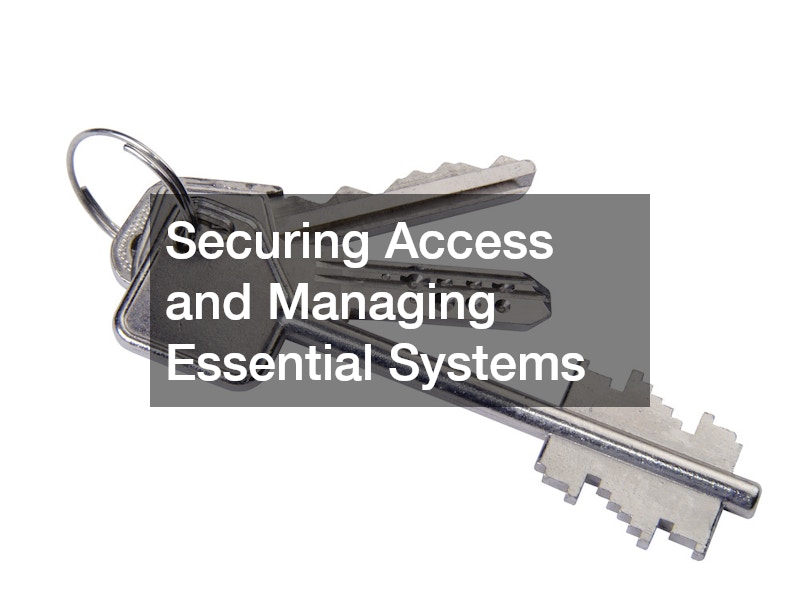
Running a restaurant is one of the most challenging yet rewarding ventures a business owner can pursue. It demands not only culinary talent and a flair for hospitality but also a thorough understanding of operations, management, and logistics. From the moment guests step through the door, every detail of the restaurant contributes to the overall experience. Ambience, cleanliness, efficiency, and service quality all play significant roles in shaping how patrons perceive your establishment.
For many aspiring restaurateurs, the focus tends to be on the menu, décor, or marketing, but these are only pieces of the puzzle. Behind the scenes, numerous operational factors influence both profitability and customer satisfaction. Inventory management, staff scheduling, equipment maintenance, and compliance with health regulations all require consistent attention. Neglecting even minor operational details can lead to disruptions that affect service quality and, ultimately, the restaurant’s reputation.
Moreover, running a restaurant requires long-term strategic thinking. Owners must anticipate challenges and plan for peak service periods, seasonal fluctuations, and unexpected equipment failures. Preventive maintenance, professional services, and dependable suppliers are critical to sustaining smooth operations. Many successful operators emphasize the importance of investing in staff training and operational processes that reduce inefficiencies and allow the kitchen and front-of-house teams to function seamlessly.
The competitive nature of the restaurant industry further underscores the need for operational excellence. Streamlining processes, reducing waste, and maintaining a clean, efficient environment are not just matters of compliance—they are strategic moves that differentiate successful establishments. Operators who stay proactive in these areas can focus more on providing high-quality food and service, which are the heart of a lasting dining experience.
Understanding the balance between customer satisfaction, employee efficiency, and operational reliability is key to long-term success. From designing an inviting space to implementing professional maintenance routines, every choice contributes to building a restaurant that can withstand both daily challenges and industry competition. This article explores the essential services and preventive measures that support smooth, safe, and profitable restaurant operations. By learning these strategies, owners can position themselves to run a restaurant that not only meets high standards but thrives over time, creating memorable experiences for every guest who walks through the door.
Maintaining Sparkling Windows for a Welcoming Environment

Clean, sparkling windows create an immediate impression for guests as they approach your restaurant. A clear view of your interior invites curiosity, conveys professionalism, and enhances the overall atmosphere. Daily smudges, fingerprints, and weather-related grime can dull even the most attractive storefront, potentially deterring walk-in traffic. Paying attention to such details is an important part of what it takes to run a restaurant successfully.
Regular professional cleaning ensures that windows remain spotless while protecting them from damage caused by harsh chemicals or abrasive cleaning methods. Maintaining bright, clear windows also helps maximize natural light inside the restaurant, which can improve mood and make the dining area feel more inviting. Using professional services allows restaurant owners to focus on core operations while keeping their establishment looking polished and approachable. These efforts contribute to the overall efficiency needed to run a restaurant smoothly.
Many owners find that commercial window cleaning elevates the overall customer experience, contributing to positive first impressions that encourage repeat visits. A well-kept exterior signals attention to detail and sets the tone for the dining experience even before guests are seated. Incorporating such practices demonstrates a commitment to operational excellence, which is key when you run a restaurant.
Preventing Clogs and Keeping Plumbing Flowing Smoothly
Proper plumbing maintenance is essential for any restaurant. A single clog in a sink or drain can disrupt kitchen operations, slow down service, and create unsanitary conditions. Routine use of effective drain cleaners helps prevent buildup and reduces the likelihood of costly repairs, which is vital to run a restaurant efficiently.
Restaurant kitchens generate significant amounts of grease, food particles, and other debris, all of which can lead to blockages if not addressed promptly. Preventive plumbing maintenance ensures that water flows smoothly throughout the facility, supporting both operational efficiency and compliance with health regulations.
By staying proactive with plumbing care, restaurant owners can avoid service interruptions that frustrate both staff and customers. Reliable plumbing also protects the investment in kitchen equipment, as backups and leaks can cause severe damage if left unattended. Consistent attention to plumbing upkeep is a simple yet critical step in running a restaurant successfully.
Managing Waste Efficiently for a Cleaner Operation
Efficient waste management is a cornerstone of a well-run restaurant. A reliable dumpster rental service helps ensure that trash and recyclables are removed regularly, keeping both the interior and exterior of the restaurant clean. Proper waste management is an essential consideration for anyone looking to run a restaurant effectively.
Accumulated waste can create health hazards, attract pests, and produce unpleasant odors, all of which harm the dining experience. Scheduling regular pickups and ensuring proper segregation of recyclables not only maintains hygiene but also aligns with sustainability initiatives that many customers value.
Streamlined waste management supports smooth operations by reducing clutter in storage areas and maintaining a sanitary environment for both employees and patrons. By partnering with a dependable waste service provider, restaurant owners can focus on core activities while maintaining a clean and professional appearance. Proper waste handling also strengthens a restaurant’s reputation for hygiene and environmental responsibility, which is crucial when you run a restaurant.
Ensuring Your Cold Storage Stays Reliable

Reliable refrigeration is critical for food safety and operational efficiency. Freezer repair and regular maintenance prevent unexpected breakdowns that could result in spoiled inventory and lost revenue. Regular checks and maintenance are part of the foundation required to run a restaurant without costly interruptions.
Temperature fluctuations or equipment failures can compromise food quality, leading to potential health risks and damaging the restaurant’s reputation. Routine inspections and timely repairs help extend the life of refrigeration units, reduce energy consumption, and maintain compliance with food safety standards.
A well-maintained cold storage system ensures that ingredients remain fresh, supporting menu consistency and customer satisfaction. Restaurants that invest in preventive maintenance are better equipped to handle high-volume periods without compromising quality or safety. Maintaining consistent refrigeration is a key step in ensuring smooth operations and reducing unnecessary waste, which is essential for anyone who wants to run a restaurant efficiently.
Keeping Floors and Seating Areas Fresh and Hygienic
Clean floors and seating areas are fundamental to a restaurant’s presentation and safety. Regular carpet cleaning removes dirt, allergens, and stains that can accumulate over time, contributing to a healthier environment for staff and guests.
Floors and carpets endure heavy traffic, spills, and debris daily, making professional cleaning essential for maintaining both appearance and hygiene. Clean surfaces reduce the risk of slips and falls while creating a pleasant dining experience that encourages repeat visits.
Beyond aesthetics, well-maintained flooring demonstrates a commitment to customer care and operational excellence. Professional cleaning services ensure that even hard-to-reach areas are thoroughly sanitized, preserving the restaurant’s image and supporting overall safety standards. Well-maintained floors also improve staff morale, creating a safer and more comfortable working environment.
Handling Electrical Needs Safely and Effectively
Electrical systems power every aspect of a modern restaurant, from lighting and cooking equipment to refrigeration and point-of-sale systems. Partnering with a qualified commercial electrician ensures that installations, repairs, and upgrades are completed safely and in compliance with local codes.
Faulty or outdated wiring can cause operational interruptions, equipment damage, or even fire hazards. Regular inspections and prompt repairs prevent emergencies that could disrupt service and endanger staff and patrons. Investing in professional electrical services allows restaurant owners to focus on their core responsibilities while maintaining a safe and reliable environment.
Efficient electrical management also supports energy optimization, reducing utility costs without compromising performance or safety. A proactive approach to electrical maintenance ensures uninterrupted operations, which is essential for restaurants seeking to run a restaurant efficiently and reliably.
Providing Clean and Safe Water Throughout Your Facility

Access to clean water is essential for cooking, cleaning, and guest consumption. Water treatment solutions help eliminate contaminants, improve taste, and ensure compliance with health standards.
Restaurants rely on consistent water quality for food preparation, sanitation, and beverage service, making proper treatment a non-negotiable aspect of operations. Regular maintenance of water systems prevents scale buildup, corrosion, and bacterial growth, all of which can impact performance and safety.
By investing in professional water treatment, restaurant owners safeguard both staff and patrons while promoting operational efficiency. High-quality water contributes to the overall dining experience, from the taste of beverages to the cleanliness of dishes and surfaces. Clean water systems also reduce equipment wear, supporting long-term operational reliability.
Managing Grease to Avoid Costly Problems
Grease accumulation in kitchens and plumbing can lead to severe blockages, fires, and compliance issues. Grease trap service ensures that fats, oils, and grease are captured before they enter drains, reducing maintenance costs and environmental impact.
Regular servicing prevents overflows, unpleasant odors, and potential health code violations, keeping the kitchen operational and safe. Proper grease management supports smooth workflow in high-volume kitchens while extending the life of plumbing infrastructure.
Restaurant owners who prioritize professional grease trap maintenance protect both their investment and the safety of staff and customers. Grease management is a crucial element in running a restaurant responsibly and avoiding unexpected operational disruptions.
Dealing with Wastewater in a Responsible Way
Effective wastewater management is essential for environmental compliance and operational efficiency. Partnering with a wastewater company helps restaurants handle effluent responsibly, minimizing the risk of contamination and fines.
Proper wastewater treatment ensures that disposal meets local regulations while protecting surrounding ecosystems. Reliable management prevents backups and operational disruptions that could impact service quality. Restaurants that invest in responsible wastewater solutions demonstrate a commitment to sustainability, community responsibility, and long-term operational stability.
By outsourcing these critical services, owners can focus on day-to-day operations while ensuring that their facility runs smoothly and safely. Wastewater management is an often-overlooked aspect of running a restaurant, yet it is essential for compliance, hygiene, and operational continuity.
Securing Access and Managing Essential Systems
Key service solutions provide reliable access control and security for restaurant facilities. From managing physical keys to electronic access systems, proper security protocols protect assets, sensitive information, and staff safety.
Effective access management prevents unauthorized entry, reduces theft risk, and supports overall operational integrity. Restaurants rely on secure access for both front-of-house and back-of-house areas, ensuring that only authorized personnel can handle sensitive tasks and equipment.
By implementing comprehensive key services, owners can maintain control over essential systems, contributing to smooth operations and peace of mind. Security is a critical piece of the operational puzzle in running a restaurant efficiently, protecting both staff and customer trust.
Running a restaurant requires careful attention to every operational detail, from the cleanliness of windows and floors to the reliability of refrigeration and plumbing systems. Successful owners understand that preventive maintenance, professional services, and responsible management practices are essential to sustaining high standards, ensuring safety, and enhancing the customer experience.
Whether it’s maintaining sparkling windows, preventing plumbing issues, or managing grease and wastewater, each aspect contributes to the overall efficiency and reputation of the establishment. Restaurants that prioritize operational excellence are better equipped to handle the pressures of high-volume service, unexpected equipment failures, and regulatory requirements.
By leveraging expert services for refrigeration repair, carpet cleaning, electrical work, water treatment, and waste management, owners can focus on providing exceptional food and service while minimizing disruptions. These measures support a consistent, safe, and inviting environment that encourages repeat visits and positive reviews.
When operators take a proactive approach to maintenance and operational efficiency, they create a foundation for long-term success. Every task, from scheduling dumpster pickups to ensuring secure access through key service, is part of a comprehensive strategy to run a restaurant effectively. Attention to detail, reliance on professionals, and strategic planning help prevent costly mistakes and operational bottlenecks, making the restaurant more resilient in a competitive industry.
Ultimately, the ability to run a restaurant successfully depends on balancing customer satisfaction, employee efficiency, and operational reliability. Owners who invest in preventive maintenance, expert services, and sustainable practices build establishments that thrive over time. By addressing these operational essentials, restaurateurs not only create enjoyable dining experiences but also safeguard their business against common pitfalls.
Operating a restaurant is demanding, but with a thoughtful approach to maintenance, safety, and efficiency, it is possible to achieve both profitability and lasting customer loyalty. Focused planning and diligent execution enable owners to confidently manage their restaurant so it consistently meets high standards, satisfies patrons, and stands out in a competitive market. Those who understand the operational intricacies, rely on professional services, and maintain a proactive approach can keep their restaurant thriving despite challenges, ensuring long-term success and growth in the industry. Running a restaurant business requires dedication, but the rewards are substantial when every detail is managed carefully. By implementing the strategies outlined here, owners can operate their restaurant efficiently and exemplarily, creating a lasting impression on every guest who walks through the door.




